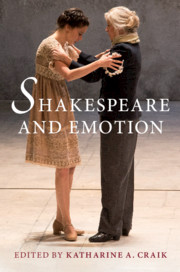Book contents
- Shakespeare and Emotion
- Shakespeare and Emotion
- Copyright page
- Contents
- Figures
- Contributors
- Acknowledgements
- Note on Text
- Introduction
- Part I Contexts
- Chapter 1 Rhetoric
- Chapter 2 Medicine
- Chapter 3 Religion
- Chapter 4 Character
- Chapter 5 Inheritance and Innovation
- Chapter 6 Communities
- Chapter 7 Audiences
- Chapter 8 Acting
- Chapter 9 Bollywood
- Chapter 10 Language
- Chapter 11 Emotional Labour
- Chapter 12 Passionate Shakespeare
- Part II Emotions
- Bibliography
- Index
Chapter 1 - Rhetoric
Titus Andronicus, Julius Caesar
from Part I - Contexts
Published online by Cambridge University Press: 01 October 2020
- Shakespeare and Emotion
- Shakespeare and Emotion
- Copyright page
- Contents
- Figures
- Contributors
- Acknowledgements
- Note on Text
- Introduction
- Part I Contexts
- Chapter 1 Rhetoric
- Chapter 2 Medicine
- Chapter 3 Religion
- Chapter 4 Character
- Chapter 5 Inheritance and Innovation
- Chapter 6 Communities
- Chapter 7 Audiences
- Chapter 8 Acting
- Chapter 9 Bollywood
- Chapter 10 Language
- Chapter 11 Emotional Labour
- Chapter 12 Passionate Shakespeare
- Part II Emotions
- Bibliography
- Index
Summary
In early modern England the theory of the emotions set out in classical rhetoric provides a context for understanding how they work in Shakespeare which is at least as important as Galenic humoral theory. The key concepts that link oratory and drama are ethos and pathos, where ethos may be understood in terms of character delineation and pathos as the emotion which character representation is intended to arouse in the audience. The key term used to describe the way rhetoric works on an audience is movere, ‘moving’. Rhetoric provided Shakespeare with a model of how to move the affections of his audience, but there are many points in his plays that reveal an awareness of the dangers of rhetoric – that the obvious deployment of artifice risks sounding insincere – and it is this that lies behind his development of more naturalistic forms of expression in his drama. This is also what lies behind the construction of Shakespeare’s reputation as the supreme exponent of the passions in the 150 years after his death, as ‘nature’ became the third term in the relationship between rhetoric and the emotions and the essential principle on which ‘moving’ is based.
- Type
- Chapter
- Information
- Shakespeare and Emotion , pp. 19 - 33Publisher: Cambridge University PressPrint publication year: 2020

